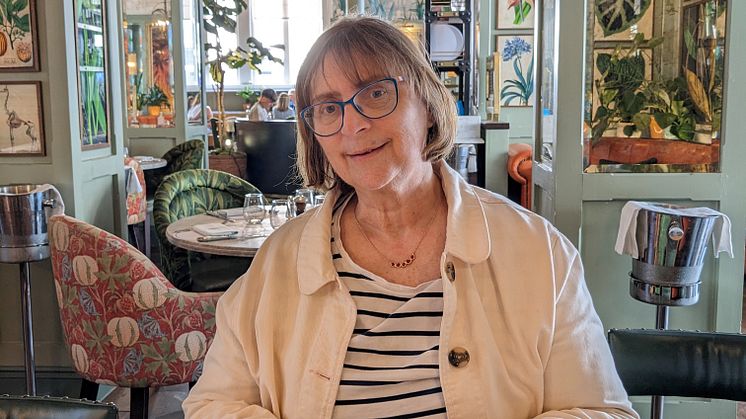
Press release -
New Oxfordshire Stroke Recovery Service means survivors ‘don’t feel alone’
A retired Oxfordshire GP has told how a new stroke recovery service in the county has played a huge role in helping rebuild her life after having a stroke at a New Year’s Eve party she was hosting.
Judith Graham said support from the Stroke Association meant she felt she wasn’t “alone with your stroke” when she went home after almost three months in hospital.
Judith had her stroke on New Year’s Eve 2022, nine months after retiring from The Key Medical Practice, Kidlington.
“I’m Scottish and Hogmanay is always a day we celebrate,” said Judith. “I decided to have my neighbours for a New Year’s Eve supper with haggis and chilli.
“I just suddenly turned and collapsed to my knees. I didn’t feel anything else. I felt completely well but when I went to stand up I couldn’t. At the party there was a doctor I had helped to train. She said I think you’ve had a stroke.”
Judith, who was then aged 64, was rushed to the John Radcliffe Hospital where the diagnosis was confirmed. She was patient there for almost two months before transferring to the Abingdon Community Hospital for rehab for further month.
For many stroke survivors, going home after a lengthy stay in hospital can feel like they have been abandoned. The Stroke Association’s Stroke Recovery Service is designed to ease that transition, support the stroke survivor and their family, and reduce the risk of readmission to hospital.
In Oxfordshire more than 600 people a year are admitted to hospital after a stroke and Judith was one of the first patients to benefit from the new service which is now celebrating its first anniversary.
Her stroke has left her with difficulty walking, weakness in her right hand and reduced vision in her right eye.
“The main effect is difficulty walking and the lack of full use of my right arm which is my dominant hand. It’s difficult to get around. It’s taken six months for me to be able to walk to the bus stop.
“The nursing staff at Abingdon and the community occupational therapist and physio made me aware of the new service from the Stroke Association,” said Judith.
“I’m a fully qualified doctor but until you’ve had a stroke you don’t know what you’re going to need or what’s available. That’s where it really helped.
“The support co-ordinator came out to see me which made the Stroke Association a very real thing. They were very pleasant and helpful, suggesting various things. I like the fact that they followed up with an email with summaries and information.
“It’s really important particularly for the elderly and socially isolated. I really felt that there was somewhere I could go. You’re not feeling alone with your stroke.
“It made a significant difference to me getting through the first few months.
“The biggest help was to know it was there. I felt someone could help me. When people spoke to me, they went away and did what they said they would do. For someone in my position it was very reassuring to have people to contact and know that you would get an answer.”
Judith was also linked up with other stroke survivors, online and on the phone, to share experiences and support each other.
“The online group was social, general chat, that was very helpful to meet people who were at different stages,” she said. “We were on Zoom and you could actually see and understand the effect stroke had had on people.”
In addition to this, she was matched with a stroke survivor in London for weekly chats on the phone through the charity’s Here for You service.
The Stroke Association’s Oxfordshire Recovery Service has now supported more than 800 stroke survivors and their families since it was launched in April last year with funding from the Buckinghamshire, Oxfordshire and Berkshire Integrated Care Board. The charity is looking into long term options for funding.
Tara Lakin, the charity’s South East Service Delivery Lead, said it built on the success of their existing Communication Support Service in the county which provides help for stroke survivors with aphasia, a condition which affects speech and language.
“We continued funding following on from this pilot service and we’re really pleased that we’re now able to support even more stroke survivors in the county,” said Tara.
“Leaving hospital after a stroke can be a frightening time because so much as changed and stroke survivors and carers have lots of questions.
“Our aim is to help people regain their confidence and independence, so they’re able to rebuild their life after stroke,” said Tara.
“We provide information, advice, emotional and rehabilitation support and help identify their personal support needs and priorities.
“We find out how they’re managing with daily activities and can signpost them to any additional support they may require.”
To find out more about the service, visit the Stroke Association’s website www.stroke.org.uk, call 01865 771624 or email oxfordshire@stroke.org.uk.
Topics
- Stroke strikes every five minutes in the UK and it changes lives in an instant.
- The Stroke Association is a charity working across the UK to support people to rebuild their lives after stroke. We believe that everyone deserves to live the best life they can after stroke. From local support services and groups, to online information and support, anyone affected by stroke can visit stroke.org.uk or call our dedicated Stroke Helpline on 0303 3033 100 to find out about support available locally.
- Our specialist support, research and campaigning are only possible with the courage and determination of the stroke community and the generosity of our supporters. With more donations and support, we can help rebuild even more lives.
- You can follow us on Twitter, Facebook and Instagram.


